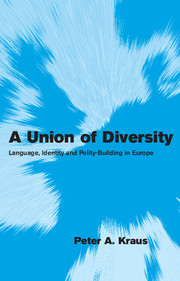Book contents
- Frontmatter
- Contents
- List of Tables and Figure
- Preface
- Acknowledgments
- A Union of Diversity
- 1 Introduction: The dynamics of European integration
- 2 The European Union's democratic deficit and the search for a European demos
- 3 The identity of a multinational polity
- 4 Language and politics: A challenge for Europe
- 5 The language question in the institutional complex of the European Union
- 6 Political communication in the transnational civil society
- 7 Recognition, self-determination and integration in a union of diversity
- References
- Index
- Titles in the series
5 - The language question in the institutional complex of the European Union
Published online by Cambridge University Press: 22 September 2009
- Frontmatter
- Contents
- List of Tables and Figure
- Preface
- Acknowledgments
- A Union of Diversity
- 1 Introduction: The dynamics of European integration
- 2 The European Union's democratic deficit and the search for a European demos
- 3 The identity of a multinational polity
- 4 Language and politics: A challenge for Europe
- 5 The language question in the institutional complex of the European Union
- 6 Political communication in the transnational civil society
- 7 Recognition, self-determination and integration in a union of diversity
- References
- Index
- Titles in the series
Summary
Since its inception in the 1950s, European integration has been a multilingual undertaking. This is true, in the first instance, in a quite trivial sense: relations between states are communicative relations. Interactions among political and administrative elites who belong to different language communities generally necessitate translation. The domain of international politics is, after all, also a domain of interpreters, and Europe is no exception to this rule. But beyond this, the European Union (EU) differs markedly from other more or less well-established arenas of interstate cooperation in that it officially accords multilingualism a very prominent place in its institutional architecture. In this chapter I will focus on the political background of the institutionalization of the EU's language regime and the practical implications of multilingualism for the European institutions.
For many years, the language issue occupied a rather inconspicuous place on the European political agenda. If newspapers had highlighted the ‘Brussels language problem’ in their headlines 20 or 30 years ago, politically informed readers would have assumed that they would find a report on the conflict between the Francophone and Dutch-speaking communities in the Belgian capital. Today, by contrast, many readers would be more likely to associate such headlines with the language situation in the EU. In fact, since the signing of the Treaty establishing the European Union, public interest in the European language regime seems to be increasing steadily, at least if one goes by press reports. German newspapers, at any rate, have recently devoted much attention to the subject.
- Type
- Chapter
- Information
- A Union of DiversityLanguage, Identity and Polity-Building in Europe, pp. 111 - 138Publisher: Cambridge University PressPrint publication year: 2008

